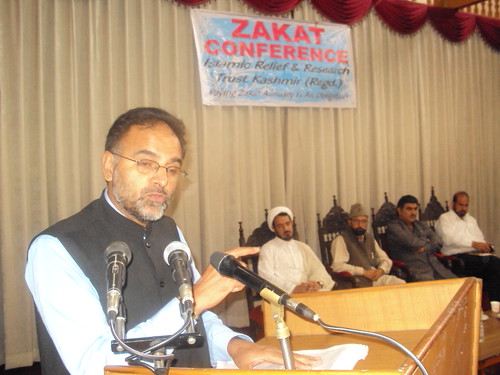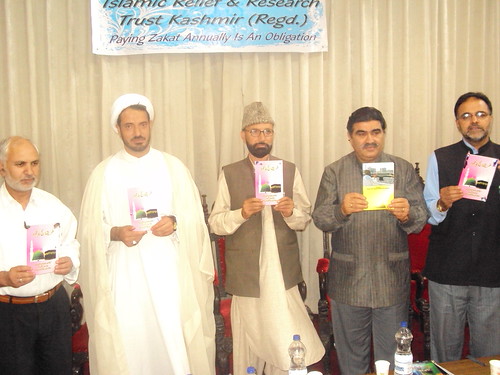By Mushtaq Ul Haq Ahmad Sikander,
Srinagar: A day long Zakah Conference was held by Islamic Relief and Research Trust (IRRT) on 10th July, 2011 at S. P College, Srinagar. A. R. Hanjura patron IRRT regarding the Zakah Conference emphasised the need for paying Zakah and collecting Zakah and disbursing it for social activities. He further upheld that government can’t deliver on all fronts and further deliberated recounting his experiences of two decades told the audience that people still can’t distinguish between Zakah, donation and Sadqa. Hanjura said that only 0.5% people of Kashmir are regular payers of Zakah and this small amount still accounts for millions and there may be some people giving Zakah privately. Hanjura further added that it is not essential for people to pay Zakah to IRRT only but people should try to make a system of collecting and disbursement of Zakah at mohalla and community level.

Prof Hamid Nassem Rafiabadi speaking
Hanjura lamented that according to new survey more than two lakh orphans are present in the valley while our orphanages can only cater needs of two thousand only. The crisis of creditability of these institutions is a grave issue too, as many people with dubious character have attained the reins of these institutions. He also tried to vanquish the myth that the institutions collecting Zakah must remain paupers as Quran says that they can use some Zakah from the collection for maintaining their substantial level of living.
Hamid Naseem Rafiabadi, Director IRRT described the pathetic condition of orphans, widows and girls who have attained marriageable age. He described the emphasis that Islam lays on Zakah and charity and the concept is to purify the wealth and the heart from the love of wealth and until we don’t spend money in Allah’s way we can’t claim that we love Allah or mankind. He emphasised the need for initiating a movement for zakah. The IRRT has founded a Zakah centre for the same purpose and the need is for Ulama to sensitize people and educate Muslims about payment of Zakah. Rafiabadi further emphasised need for organising small workshops instead of grand congregations and processions.
Aslam Andrabi, Shah e Hamdan Research Foundation (SHRF), said that Zakah is emphasised more than 80 times in Quran, and always comes with Salah. He also deliberated about the status of the Muslim in jurisprudence who don’t pay Zakah. If the zakah isn’t paid even on the Lawful earned money it makes it unlawful. Andrabi further threw light on the Seerah of Prophet Muhammad(SAW)towards Zakah and Charity. Even the non payment of Zakah made muslims go for battle against the rebels of Zakah. Zakah is obligatory on every rich person, and the right of poor in the wealth. Andrabi lamented on the fact that Muslims spend millions on mobile bills and cigarettes but the empathy towards fellow beings is absent. He also congratulated IRRT team for conducting such sessions which are educative and help in sensitizing people about various issues facing Kashmiri society.

The book is being released by Justice Bashir Kirmani, Mirwaiz Central Kashmir Maulana Syed Abdul Latif, A.R Hanjura, Hakeem Sajad & Prof Rafiabadi
Farooq Ahmad Renzu, Director Information, said that concept of Zakah is based on conscience, empathy and intention of Muslims. It is regarding your consciousness towards people and Allah. He described lust for money and materialism as the basic impediments towards the non payment of Zakah. He also advised Muslims to guard their conscience because when the conscience is dead then everything is permissible. He contrasted communism and capitalism and described Islam as having the best monetary system. Islam has given the freedom of choice to people and the world is a testing place. If we are not conscious about the orphans, widows and half widows then how can we meet the challenges baffling our society. Renzu described Islam as embodiment of love. He expressed desire for organising a civil society meet with orphans face to face, so that they can have a live interaction about the problems facing the society.
Dr Mushtaq ahmad, officer on special duty said that Kashmiris lay more emphasis about Salah and fasting but never about Zakah. He said that we must start from our home as charity begins at home, then initiate a district-wise collection of zakah.
Mirwaiz Central Kashmir, Syed Abdul Latif, lamented that hedonist lust for wealth is the root of all evil. The more a man gains wealth the more his lust grows. Muslims must hold Allah most dear, and then they will follow the fundamentals of Islam. The wealth is only given to Muslims as a test not for pompous shows and display. He said that Exploitation is prevalent in our society which breeds anger, resentment and even violence and if these downtrodden aren’t helped then class struggle will certainly initiate. Hence money needs to be circulated which will certainly help in reducing the class struggle. He stressed on the need of creating one central bait ul maal with branches in all districts which will help us in meeting these challenges, though it is a difficult task but surely we can be initiators of the same, which will help usher a new era of peace, love, fraternity and tranquillity. Plus the Ulema of all sects must join in this movement.
Muhammad Akbar Gania, additional deputy commissioner Srinagar, said that Zakah and Salah are emphasised together again and again in the Quran. The people are either blind, deaf or deliberately turn blind about the social problems, despite being aware that lakhs have been martyred, but when it comes to rehabilitation none is ready for the same. None has undertaken widow remarriage. He lamented about the practical problems facing victims of conflict. Our society has to think and take action otherwise just speaking wouldn’t help.
Showkat Hussain Dar, HOD Islamic Studies, Islamic University of Science and Technology(IUST) also spoke on this occasion about the perverted form of Sufism prevalent in the subconscious of our society which makes them resort to escapism while dealing with the challenges facing the society. They think their salvation lies in their individualistic efforts that too through a way of monasticism while as Islam emphasises for collective life and helping each other of which Zakah is an important pillar. He also lamented about the fact that Kashmir despite being a Muslim majority still no bank in Kashmir has any option or window for Islamic banking.
Showkat Shaheen, Imam Masjid e Iqra cautioned the audience that people still mistrust the social organizations because many black sheep have crept within the ranks of Social activists and social organisations, hence the response from people would be quite low, but with dedication, selfless and steadfastness towards the welfare of people, the genuine organisations are surely going to build a credibility resulting in the overwhelming response of the people. He also lamented about the fact that most of the Zakah is donated to Madrasas whose cadres after completion of their education further open new madrasas and a vicious circle is formed and this trend needs to be curbed.

Maulana Hakeem Sajad addressing
Mufti Zia ul Haq, Mufti e Azam Bijbehara deliberated on the issue of Zakah from Quranic point of view and in his long paper deliberated on different issues pertaining to Zakah as described in Quran, Hadith, Jurisprudence and the new issues which have been raised in the modern times. Maulana Hakeem Sajad said that Islam has a solution for all problems but we are too lazy and not ready to find out the solution of the present day problems and challenges from Quran and Sunnah. He said that like Salah we need to establish Zakah too and in this context he described the example of Mauritius as best where he has worked, though the Muslims being in minority there they still have established a perfect system of Islamic economic Model.
Hilal Ahmad, a research scholar of Kashmir University also delved on the Islamic Economic System contrasting it with Capitalism and Communism. Mushafiq Sultan Parray, Editor of The Intellectual also delved on various aspects of Zakah.
Justice Bashir Ahmad Kirmani in his presidential address quoting figures and statistics said that Kashmiri society has become a hedonist consumerist society where the conferences like these are just a cry of a dying soul. Kirmani further said that most of the Muslims resort to unlawful means for filling their coffers and indulge in various kinds of exploitation to gratify their lust of money, in that society the feeling for widows, orphans and downtrodden will grow frail after each passing day. He further advised the social organizations to work only for attainable goals and not keep some high ideals and believe in some Utopian concepts. Kirmani also said that for Muslims only Islam remains as the ideal uniting force so if we have to opt for the social reforms we have to try to implement the fundamentals of Islam and Zakah is one of them.
A book on Hajj authored by A.R Hanjura in Kashmiri was also released on this occasion. The vote of thanks was delivered by Prof Hamid Naseem Rafiabadi. The conference also passed a resolution which goes as
CONFERENCE RESOLUTION
1. The conference urges all the Muslims to organize Baitul Maal’s at their Mohalla, Village and other levels, where they will collect Zakaat (during Ramadaan).
2. Zakaat Fund may be raised every year centrally and later on that will be distributed among different organizations working for various social projects, so that all the clauses of Zakaat are take care.
3. Islamic Relief & Research Trust must organize an advisory board to discuss matters related to zakaat system in Kashmir.
4. Awareness must be generated for Islamic Financial investment (Islamic Banking) in J&K.
5. The conference impresses upon the Muslim Social Organizations to reach to a Common Minimum Program to redress the problems of the people.
—
Mushtaq Ul Haq Ahmad Sikander is Writer-Activist based in Srinagar, Kashmir and can be reached at [email protected].

